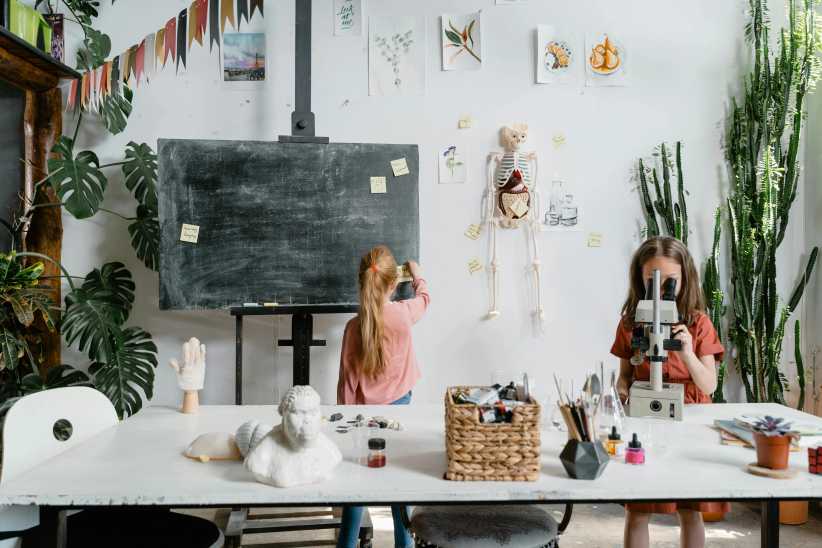If you have bright children who seem to be losing interest in school, it may not be because they do not like it–they might just be bored.
Gifted children might not feel academically stimulated and may be disillusioned by the educational process if the work is not challenging enough, which is why gifted and talented programs such as Village East Gifted, Inc.™ exist.
Tobi Phillips, Ed. D. (cert.), is the founder of Village East Gifted, Inc.™, which operates in Huntington and Roslyn on Long Island, and offers more than 30 classes a week in subjects like Latin, SAT Vocabulary, global studies, writing, geography, art, mathematics, research/study skills, science, technology, engineering, and mathematics. These are her tips to raise, motivate, and teach gifted children.
Teach Upwards
Whether a gifted child is 3 years old or graduating from high school, cognitive challenge—so sorely needed by brilliant students—cannot be “rounded off” or assumed. Determine the highest level of comprehension and begin there. You will be amazed at how much a gifted child can learn if they have to “step up to the plate.”
Listen for Seemingly Irrelevant Comments
Why does a gifted child constantly ask seemingly unrelated questions? To a gifted mind, everything in life is connected in some way. Whatever is seen, felt, or heard has been etched in their minds since infancy. Learn from them. Can they explain the cognitive path they took to derive their question? Then, let them describe the trains of thought needed to bring the conversation (or lesson) back to the original topic. Classroom teachers (and parents) have a lot to accomplish in a day. If a gifted child “goes off on a tangent,” (which is often distracting to others), he/she should be encouraged to keep a journal of comments and inquiries, which can be used later as a conversation starter at the dinner table.
Practice Randomness
Gifted students love surprises—the unpredictability of a learning experience. Many are accustomed to hearing what they already know. Ask your child or a class of gifted students to “secretly” submit creative ideas that must be incorporated into a “traditional” class assignment. Requiring their brains to connect these random elements in a coherent and sequential way will reawaken their minds and instill a sense of wonderment and confidence in the educational experience.
Work Against the Clock
Students with brilliant minds learn everything the first time it is introduced. Asking a gifted child to do more of the same problems to prove their mastery leads to boredom and immediately disengages them. Instead, let them race “against the clock” by demonstrating how quickly they can process and recall new information. For example, how fast can they recall the definitions of 15 new vocabulary words or identify all the countries and landmarks in Asia? Or, how can they demonstrate how to utilize a new mathematical concept in six different kinds of problems in 60 seconds? The faster they can demonstrate it, the happier they will be. (Note: the faster the demonstration, the louder their voices become. Really!).
Integrate Feasible Fantasies
Gifted students feel safe with “facts and figures.” There is often an innate fear of being wrong or venturing “outside the box.” After children learn about their giftedness, it often leads to a never-ending effort to prove it, especially to themselves. To help ease the transition from the safety of definitiveness to creativity, integrate facts into their imaginations. Then, there is no turning back; they suddenly transform into happy, confident, and creative children. Encourage them to create projects for school, or at home, that integrate facts with “feasible fantasies” to add entertaining twists. Can the life and historic influences of a famous artist be incorporated into a story taking place in another era of history? Watch a gifted child run with it. It’s an explosion of their minds… and yours.
Build Movers and Shakers
When stimulating the “multiple intelligences” of a brilliant child, learning becomes an interactive, rigorous, mental, emotional, social, and physical experience. Engaging a gifted learner by “shaking it up” or adding physical movement, music, drama, sports, and cooperative games substitutes boredom with a yearning to learn everything the same way. Consequently, parents of brilliant children and gifted educators must continually have new tricks up their sleeve to keep learning challenging and refreshing…at any given moment.
Photo courtesy of Village East Gifted
Main photo: Students in grades 4-5 create unique problems and cooperatively derive lateral solutions.




















